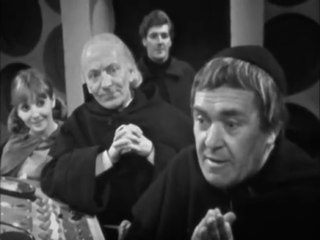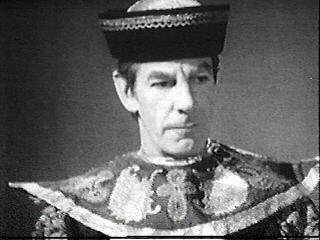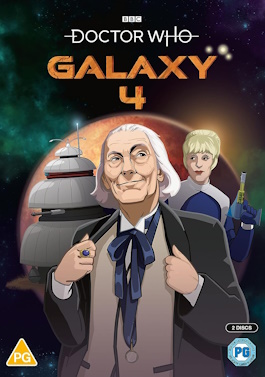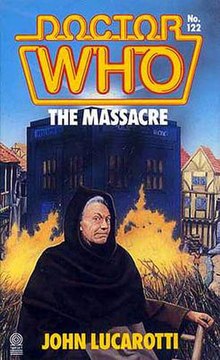
Marco Polo is the fourth serial of the British science fiction television series Doctor Who. It was first broadcast on BBC TV in seven weekly parts from 22 February to 4 April 1964. It was written by John Lucarotti and directed largely by Waris Hussein; John Crockett directed the fourth episode. The story is set in Yuan-era China in the year 1289, where the Doctor, his granddaughter Susan Foreman, and her teachers Ian Chesterton and Barbara Wright meet the Italian merchant-explorer Marco Polo and Mongolian Emperor Kublai Khan.

The Aztecs is the sixth serial in the British science fiction television series Doctor Who, which was first broadcast on BBC1 in four weekly parts from 23 May to 13 June 1964. It was written by John Lucarotti and directed by John Crockett. In the serial, the First Doctor, his granddaughter Susan, and teachers Ian Chesterton and Barbara Wright arrive in Mexico during the Aztec empire. Barbara becomes mistaken for the goddess Yetaxa, and accepts the identity in hope of persuading the Aztecs to give up human sacrifice, despite the Doctor's warnings about changing history.

Ian Chesterton is a fictional character in the British science fiction television series Doctor Who and a companion of the First Doctor. He was played in the series by William Russell and was one of the members of the programme's first regular cast, appearing in much of the first two seasons from 1963 to 1965. In a film adaptation of one of the serials, Dr. Who and the Daleks (1965), he was played by Roy Castle, but with a very different personality and backstory. Ian appeared in 16 stories and 77 episodes. He later returned for a cameo appearance, played once again by Russell, in the 2022 episode "The Power of the Doctor".
The Invasion of Time is the sixth and final serial of the 15th season of the British science fiction television series Doctor Who, which was first broadcast in six weekly parts on BBC1 from 4 February to 11 March 1978. It features the final appearance of Louise Jameson as the companion Leela.

Steven Taylor is a fictional character played by Peter Purves in the long-running British science fiction television series Doctor Who. A space pilot from Earth in the future, he was a companion of the First Doctor and a regular in the programme from 1965 to 1966. Steven appeared in 10 stories.

Dorothea "Dodo" Chaplet is a fictional character played by Jackie Lane in the long-running British science fiction television series Doctor Who. An Earth teenager from the year 1966, she was a companion of the First Doctor and a regular in the programme in its third season, from February to July 1966. Only three of the serials in which Dodo appeared as a regular are complete in the BBC archive. Dodo's personality was an unsophisticated, bright and happy one.

Peter John Purves is an English television presenter and actor, best known for presenting the children's television programme Blue Peter for 11 years during the 1960s and 1970s. He is also known for presenting the BBC's Darts broadcasts, the Kick Start series and BBC coverage of the Crufts dog shows, and also for an early acting role in the BBC science fiction series Doctor Who.

The Daleks' Master Plan is the mostly missing fourth serial of the third season in the British science fiction television series Doctor Who, which originally aired in twelve weekly parts from 13 November 1965 to 29 January 1966. This twelve-part serial is the longest with a single director and production code (The Trial of a Time Lord was longer but was made in three production blocks, with separate codes, and with four separate story lines each with their own authors and working titles).

The Chase is the eighth serial of the second season in the British science fiction television series Doctor Who. Written by Terry Nation and directed by Richard Martin, the serial was broadcast on BBC in six weekly parts from 22 May to 26 June 1965. Set in multiple time periods on several different planets, including Aridius, Earth, and Mechanus, the serial features the Dalek race travelling through time while pursuing the TARDIS and its occupants—the First Doctor and his companions Ian Chesterton, Barbara Wright, and Vicki —to kill them and seize the TARDIS for themselves. The Doctor and companions encounter several characters, including monsters Dracula and Frankenstein's monster, human astronaut Steven Taylor, and an android replica of the Doctor.

The Ark is the sixth serial of the third season of the British science fiction television series Doctor Who, which was first broadcast in four weekly parts from 5 to 26 March 1966.

The Time Meddler is the ninth and final serial of the second season of the British science fiction television series Doctor Who. Written by Dennis Spooner and directed by Douglas Camfield, the serial was broadcast on BBC1 in four weekly parts from 3 to 24 July 1965. Set in Northumbria in 1066, before the Battle of Stamford Bridge, the serial features the time traveller the First Doctor and his companions Vicki and Steven Taylor as they attempt to outwit the time traveller the Monk, who is plotting to change the course of European history by wiping out King Harald Hardrada's Viking invasion fleet, leaving Harold Godwinson and the Saxon soldiers fresh to defeat William of Normandy and the Norman soldiers at the Battle of Hastings.

Galaxy 4 is the first serial of the third season of the British science fiction television series Doctor Who. Written by William Emms and directed by Derek Martinus, the serial was broadcast on BBC1 in four weekly parts from 11 September to 2 October 1965. In the serial, the First Doctor and his travelling companions Vicki and Steven arrive on an arid planet, where they encounter the beautiful but dangerous Drahvins and the hideous but friendly Rills, two crash-landed species in conflict with one another. Both species wish to escape as the planet is set to explode in two dawns, but the Drahvin leader Maaga wants only her people to make it out alive.

The Myth Makers is the third serial of the third season of the British science fiction television series Doctor Who. Written by Donald Cotton and directed by Michael Leeston-Smith, the serial was broadcast on BBC1 in four weekly parts from 16 October to 6 November 1965. In the serial, based on Homer's Iliad, the First Doctor and his travelling companions Vicki and Steven land in Troy during the Trojan War. The Doctor is captured by the Greeks and forced to formulate a plan for taking the city, while Steven and Vicki are captured by the Trojans and forced to devise a means of banishing the Greeks; the latter duo meet Katarina, who becomes a companion by the serial's end.

The Celestial Toymaker is the mostly missing seventh serial of the third season in the British science fiction television programme Doctor Who, which was first broadcast in four weekly parts from 2 to 23 April 1966.

The Gunfighters is the eighth serial of the third season in the British science fiction television series Doctor Who, which was first broadcast in four weekly parts from 30 April to 21 May 1966.

The Savages is the completely missing ninth serial of the third season in the British science fiction television series Doctor Who, which was first broadcast in four weekly parts from 28 May to 18 June 1966.

The First Doctor is the original incarnation of the Doctor, the protagonist of the British science fiction television series Doctor Who. He was portrayed by actor William Hartnell in the first three series from 1963 to 1966 and the tenth anniversary story The Three Doctors from 1972 to 1973. The character would occasionally appear in the series after Hartnell's death, most prominently as portrayed by Richard Hurndall in the 1983 multi-doctor special The Five Doctors, and as portrayed by David Bradley in the 2017 Twelfth Doctor episodes "The Doctor Falls" and "Twice Upon a Time" and in the 2022 Thirteenth Doctor episode "The Power of the Doctor", the latter previously having portrayed Hartnell himself in the 2013 biopic An Adventure in Space and Time.
John Wiles was a South African novelist, television writer and producer. He was the second producer of the science fiction series Doctor Who, succeeding Verity Lambert, and credited on four serials between 1965 and 1966, namely The Myth Makers, The Daleks' Master Plan, The Massacre of St Bartholomew's Eve, and The Ark.
Donald Tosh was a BBC screenwriter who contributed to Doctor Who in 1965. He was the last surviving script editor and writer from the William Hartnell era.

The third season of British science fiction television series Doctor Who began on 11 September 1965 with the story Galaxy 4 and ended on 16 July 1966 with The War Machines. Only 17 out of 45 episodes survive in the BBC archives; 28 remain missing. As a result, only three serials are complete.


















